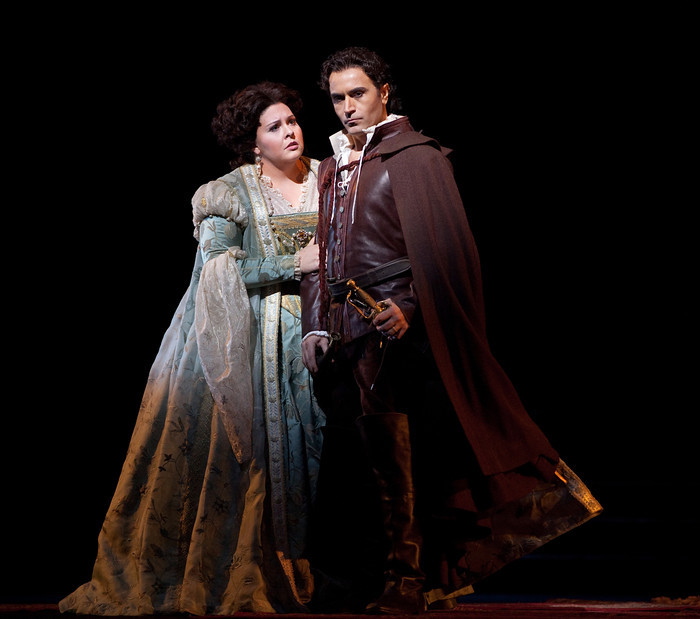Met’s “Ernani” revival proves a variable bag of Verdi

Angela Meade as Elvira and Roberto De Biasio as the title character in Verdi's "Ernani" at the Metropolitan Opera. Photo: Marty Sohl.
“That one evening shaped my entire life,” wrote the poet Théophile Gautier of the tumultuous 1830 premiere of Victor Hugo’s drama Hernani. Partisans of Hugo’s Romantic principles and greybeard Classicists squared off, trading insults and blows. Historians say that the months-long aesthetic battle spilled over into real combat: the July Revolution that brought about a constitutional monarchy in France.
Nearly as momentous was the Hugo-inspired Ernani in the career of Giuseppe Verdi. It was his first European triumph, and it also marked his first collaboration with the librettist Francesco Maria Piave, his most important partner.
Ernani returned to the Metropolitan Opera Thursday night in a middling revival of Pier Luigi Samaritani’s 1983 production, now staged by Peter McClintock. The tale of a bandit loved by a young woman who spurns both a dynastic marriage and a king’s favors only to have her beloved die in her arms—Ernani is as tough a sing as Il trovatore, with which it shares a reckless, smoldering exaltation.
Much interest centered on the evening’s Elvira, the soprano Angela Meade. A recent winner of the Beverly Sills Artist Award for young singers, Meade in recent years has attracted notice with second-cast and cover performances of Verdi and Donizetti at the Met and the fearsome title role of Bellini’s Norma at the Caramoor Festival. She has a sumptuous voice—lush, blooming, bright and majestic as sunlight—and her proud stage presence is that of a diva to the manner born. She negotiated the peaks and valleys of Ernani, involami with ease and commendable agility, and her cadenza was a thing of heart-stopping beauty, a buoyant, shimmering pianissimo that recalled Montserrat Caballé.
Like any up-and-coming artist, Meade also has faults to iron out. She has a tendency to breathe in the middle of words; and her tone, for all its splendor, sometimes turns squally and seems less than ideally controlled. All the same, to judge by the roar that greeted her big scenes and curtain calls, the Met’s investment in Meade may well garner the company a real star.
In his role debut, Dmitri Hvorostovsky made a memorable entrance as Don Carlo, the libidinous king of Spain. Other baritones simply walk through a door; Hvorostovsky, instead, conveyed all of his character’s predatory hauteur with the tilt of his head and the snake-like glimmer of his eyes before he had sung a single note. His vocalism was uneven. As often happens when he performs Verdi, Hvorostovsky inflated his gorgeous voice, barking his way through Lo vedrem, o veglio audace and shouting at the climax of O dei verd’anni miei. His best moments came with the suave, patronizing irony of Vedi come il buon vegliardo and the noble, long-breathed phrases of O sommo Carlo.
Roberto De Biasio in the title role delivered the text with exemplary clarity and cut a handsome, sympathetic figure as Verdi’s doomed bandit. In somewhat brittle voice during the opera’s opening scene, De Biasio grew from strength to strength as the evening went on, though his warm and soulful sound sometimes disappeared in ensembles and in duet with his force-of-nature leading lady. Ferruccio Furlanetto, a masterful Silva in seasons past, showed again why he is today’s greatest interpreter of Verdi’s bass roles. His inky, hate-filled tone in the opera’s final scene (Ecco il pegno) chilled the blood, though almost any of his utterances could be singled out for musical and dramatic mastery.
Mary Anny McCormick, Jeremy Galyon, and Adam Laurence Herskowitz performed minor roles capably, and the men of the Metropolitan Opera Chorus under Donald Palumbo served up a lusty drinking song in the opera’s opening scene and a thrilling Si ridesti il Leon di Castiglia. The baroque, energetic contours of Samaritani’s set designs impress, but the staging, no great shakes thirty years ago, is a strictly park-and-bark affair.
Marco Armiliato’s conducting ran the gamut. His reading of the opera’s roiling prelude was taut and riveting, and his handling of the final trio tepid and sluggish. For reasons unknown, he opted to include as the cabaletta to Silva’s cavatina Infin che un brando vindice. Verdi wrote this for a revival of Oberto and there is no firm evidence that the composer ever agreed to its inclusion in Ernani.
Ernani runs through February 25, with Marcello Giordani scheduled to take over the title role on February 14, and a Live in HD broadcast on February 25. metoperafamily.org; 212.362.6000.
Posted Feb 04, 2012 at 6:48 am by John Baker
Dmitri Hvorostovsky BARKING and SHOUTING?! Did you hear him? You must be sound def! He has the most gorgeous baritone voice of our days and the purity of his singing line is amazing. Never barking as Furlanetto did! He was noble and royal during this performance, showed his unbelievable breath control in the third act and was uttermost dignified and proud during “O Sommo Carlo”, just as the King should be!
How can someone define his singing as barking and shouting… bah!
Posted Feb 26, 2012 at 10:53 am by Carl Thomas
Park n Bark refers to the staging, specifically a lack of movement and flow. it’s not a judgement of the singing.